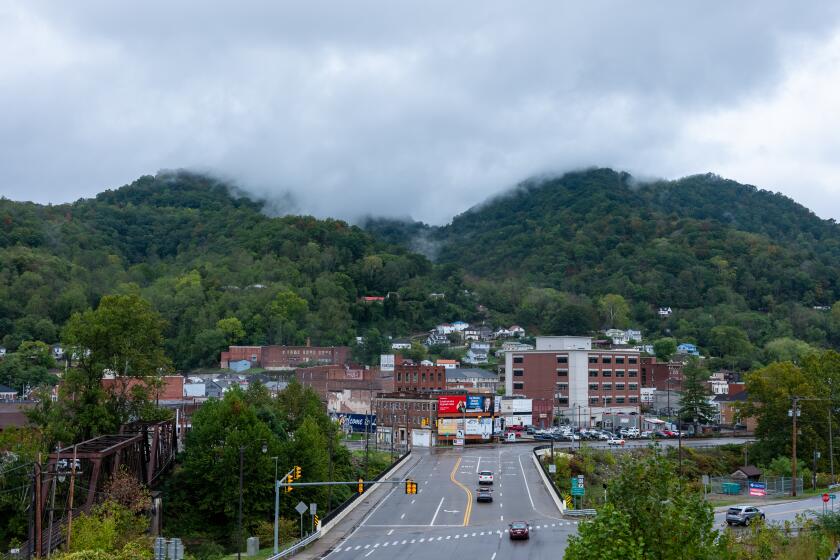Environmentalists deplore Schwarzeneggerâs corporate turn
Reporting from Sacramento â Gov. Arnold Schwarzeneggerâs efforts to give a boost to corporate California are colliding with his image as an environmental crusader in his final days in office.
Administration officials say their moves are needed to protect jobs in a fragile economy. But environmentalists are dismayed by what they see as a feverish push to limit restrictions on toxic chemicals in retail goods, ease key air pollution rules and permit the use of a known carcinogen to treat soil in strawberry fields.
The Sierra Club grumbles that the governorâs plan for implementing the stateâs landmark global warming law is a giveaway to industry.
The administrationâs maneuvering highlights a tension present at the outset of Schwarzeneggerâs tenure: the environmental activist versus the business executive.
Schwarzenegger spokesman Aaron McLear said the governorâs environmental record is indisputable, citing big strides he has made in curbing greenhouse gas emissions under the landmark global warming law, AB 32, signed by Schwarzenegger in 2006.
âThis governor has implemented the most historic aggressive environmental regulations in the country and sometimes the world,â McLear said. âItâs just not credible to argue otherwise.â
But activists say they are sorely disappointed by some of the governorâs recent moves.
âI think theyâd rather take heat from some environmental groups and some scientists than they would from Dow, DuPont and Exxon Mobil,â said Bill Allayaud, director of government affairs for Environmental Working Group, an advocacy organization focused on toxic chemicals.
Last-minute actions on the state Green Chemistry Initiative were a particular letdown to environmental activists.
The program is meant to remove dangerous chemicals from retail products. But a recent loosening of the regulations by the administration prompted 33 environmental, health and community groups to warn that they had become âso ineffective and burdensome that they should be jettisoned altogether.â The groups accused the administration of putting the industry-friendly changes on a fast track before the inauguration of Jerry Brown, who may not be as business-friendly.
The changes so disturbed the author of the legislation creating the program, Assemblyman Mike Feuer (D- Los Angeles), that he no longer supports the regulations.
Jim Marxen, a spokesman for the state Department of Toxic Substances Control, said the administration did nothing irregular; dozens of interest groups participated in the development of the new rules, which are meant to streamline and prioritize the list of targeted chemicals and the consumer products containing them.
Still, the outrage from environmentalists and lawmakers prompted the secretary of the California Environmental Protection Agency this week to ask the department to hold off on finalizing the regulations, allowing the review period to be extended and giving another chance for the departmentâs scientific advisory council to weigh in.
The Schwarzenegger administration also fast-tracked regulations to permit agribusinessâ use of the controversial chemical methyl iodide to treat soil in fields where strawberries and other crops grow.
The push came despite a finding from the Department of Pesticide Regulation that the chemical âcould result in significant health risks for [farm] workers and the general population.â An independent panel of scientists confirmed that assessment, warning that methyl iodide could poison the air and water.
The administration defended the move by noting that companies using the chemical must establish strict buffer zones and ground water protections.
âThis is the most evaluated pesticide in the departmentâs history,â said Lea Brooks, a spokeswoman for the Department of Pesticide Regulation. âThese are the nationâs toughest restrictions.â She denied charges by several groups, including the Natural Resources Defense Council, that the public comment period was improperly shortened so the changes could be pushed through before Schwarzenegger leaves office.
Changes in air pollution rules that apply to diesel trucks, school buses and construction equipment are another source of frustration for environmentalists. After heavy industry lobbying, the state Air Resources Board last week voted to give businesses more time to comply and to exclude some vehicles from required retrofits.
Although air quality officials say the state is on track to cut diesel emissions in half by 2014, environmentalists lamented rollbacks to regulations that were the first of their kind nationally, saying soot would continue to harm Californians.
The administrationâs implementation of the stateâs landmark global warming law, meanwhile, is getting mixed reviews from activists.
The Sierra Club warned that new regulations establishing a carbon trading regime include a giveaway to certain industries, pointing to allowances for emissions that were awarded at no cost rather than auctioned, as a state advisory committee had recommended. The plan also allows companies to purchase credits to avoid reducing pollution at their own facilities. Among the sellers of such credits will be timber companies that pledge to increase the carbon storage in forests, possibly by clear-cutting and planting new trees.
Sierra Club lobbyist Bill Magavern says oil companies would be the biggest beneficiary of the free allowance system. âThe state will be giving oil companies valuable commodities for free, setting them up for windfall profits,â he said.
But other groups, including the Nature Conservancy and the Environmental Defense Fund, said the tradeoffs are a small price to pay for launching a cap-and-trade system at a time when national legislation on the issue is stalled.
âHeâs been a real-world action hero on the most important issue of our generation,â Fred Krupp, president of the national Environmental Defense Fund, said of the governor.
The sentiment, however, is not universal.
âHow green is he?â asked the Sierra Clubâs Magavern. âWe came to the conclusion that heâs olive-drab.â
More to Read
Get the L.A. Times Politics newsletter
Deeply reported insights into legislation, politics and policy from Sacramento, Washington and beyond. In your inbox three times per week.
You may occasionally receive promotional content from the Los Angeles Times.










